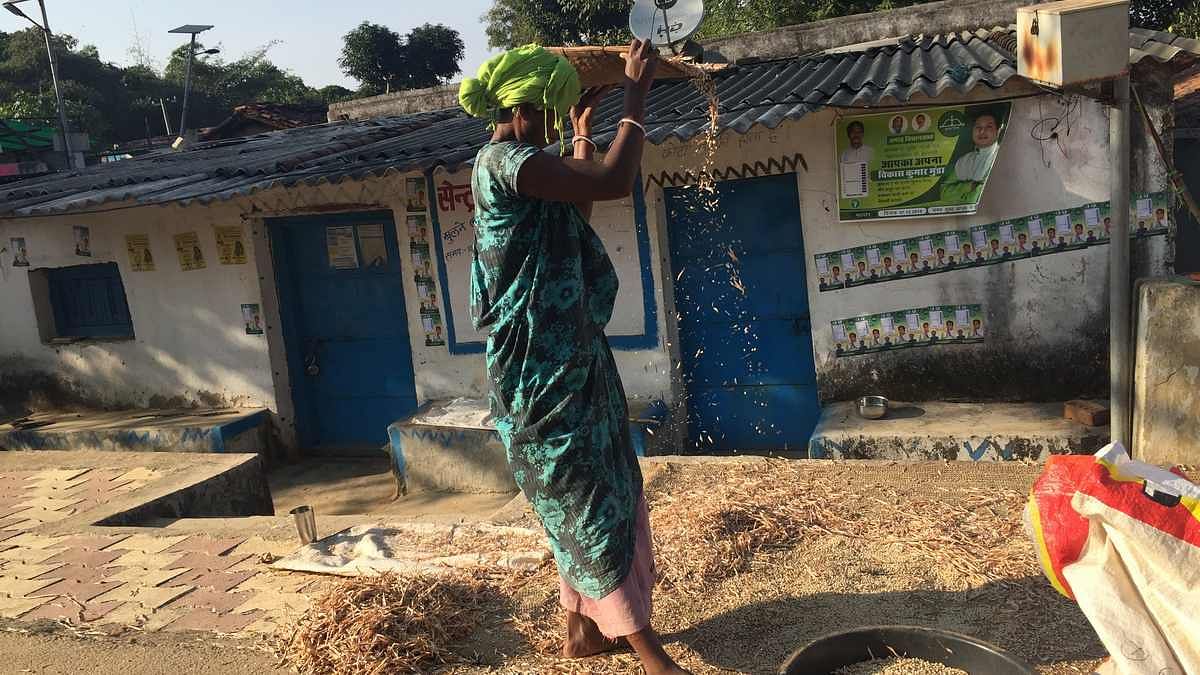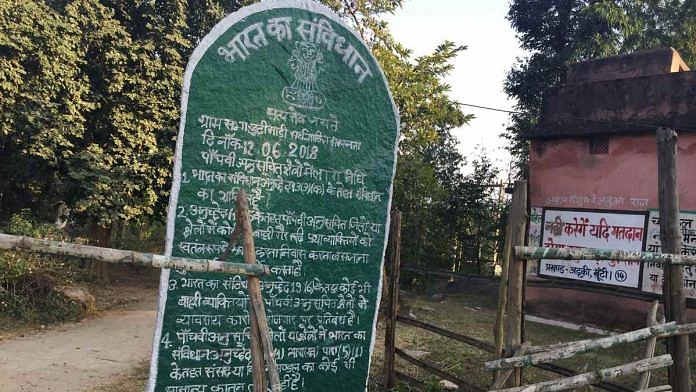Ranchi/Jharia/Dumka: Much of who will emerge the winner in the Jharkhand assembly elections — the BJP or the Congress-JMM-RJD alliance — will depend on how the tribal versus non-tribal narrative plays out in the state.
Nobody knows this better than the BJP, the first party to complete a five-year term in the state since its formation in 2000.
In a state that was carved mainly to safeguard the interest of the tribal population, BJP turned conventional logic on its head and surprised everybody in 2014 when it appointed the state’s first non-tribal chief minister — Raghubar Das.
Since then the BJP has played a very delicate game of wooing the non-tribals — general, Scheduled Castes and Other Backward Castes (OBCs) — on the one hand, and reaching out to tribals who have not converted to Christianity, through a slew of policy and schemes, on the other.
While OBCs constitute 46.1 per cent of the Jharkhand population, Scheduled Tribes (STs) constitute 26.2 per cent, according to Census 2011.
“Whichever party manages to get a sizeable chunk of OBC and ST votes will be the winner,” said professor B.K. Sinha, head, department of political science, St. Xavier’s College, Ranchi.
Jharkhand is currently undergoing a five-phase election, with the third phase held Thursday. The results will be declared on 23 December.
BJP strategy to woo non-tribals
After coming to power, the Raghubar Das government brought in a new liberal domicile policy in 2016. It mandated that those who have lived and worked in Jharkhand for 30 years, and have acquired immovable properties will automatically become residents of the state.
“The earlier policy, which was stayed by the (Jharkhand) High Court, granted domicile status on the basis of 1932 land records, and had resulted in lot of acrimony between the tribal and non-tribal,” said a state BJP leader, who didn’t wish to be named.
The new policy was one of the first initiatives aimed at winning the non-tribal populace in the state.
“The domicile policy benefitted lakhs of non-tribal living in Jharkhand,” said the BJP leader quoted above.
In 2016, the government also proposed to amend two of the state’s tenancy laws to make the sale of tribal land to non-tribals less cumbersome. The Chota Nagpur Tenancy Act and the Santhal Parganas Tenancy Act restrict the sale of tribal land to non-tribals.

But the government’s move backfired badly among the tribals, resulting in massive protests and tribals versus non-tribals clashes. Buckling under pressure, the government backed down and withdrew the proposed bills.
In this election, “BJP wants to grab our land” is the common refrain among tribals across Jharkhand.
Speaking to ThePrint, former Jharkhand chief minister and JMM chief Hemant Soren said, “What BJP was trying to do under the garb of amending the land law for development work was to benefit its corporate friends. But the tribals will never let go of their land. We will never allow it.”
Also read: Not just voters, Jharkhand BJP leaders too not confident of party’s Ayodhya-370 poll plank
Other parties also trying to win over OBC votes
In its bid to woo non-tribals further, the BJP has promised reservation for the OBCs. It has proposed to set up a commission to review the OBC quota on the basis of population.
But the party that won 37 seats in 2014 faces stiff competition from both the Congress and the All Jharkhand Students Union (AJSU), a former BJP ally, in luring the OBC vote.
Congress, which won six seats in 2014 and also has an OBC vote base, has promised to increase quota for the community from the current 14 per cent to 27 per cent. Currently, the total reservation for OBCs, Scheduled Tribes and Scheduled Castes is at 60 per cent — 11 per cent for SCs, 22 per cent for OBCs and 27 per cent for STs.
Congress ally JMM, which won 19 seats the last time around, has promised to increase the total quota to 67 per cent — 12 per cent for SCs, 27 per cent for OBCs and 28 per cent for STs.
The AJSU, which has a sizeable presence among the Kurmis, an OBC community, has also made the same promise as Congress. The AJSU won five seats in the last assembly elections.
Political analysts suggest the OBC votes will get split among all the major parties — BJP, Congress, JMM, AJSU, Jharkhand Vikas Morcha, and even the JD(U), which is contesting 48 seats.
“OBC is a heterogenous group. Besides Kurmi, the other dominant OBC community in Jharkhand is the Mahato. Both JMM and AJSU are the main claimant of the Mahato vote. But since it is a dominant OBC community, other parties also trying to win over them,” said Jharkhand-based economist and political analyst Harishwar Dayal.
Tribals disgruntled with BJP despite welfare schemes
Looking to win over the tribals, the Raghubar Das government introduced a plethora of welfare schemes during its term — scholarship for tribal students, building houses for tribals, model villages for tribal martyrs, healthcare facilities, among others.
But these might not be enough.
The government’s attempt to amend the tenancy laws has created a lot of resentment among the tribal populace across Jharkhand.
The ‘Pathalgadi movement’, which started in 2017 from the Khunti district and rapidly spread to other tribal dominated pockets, was the direct fallout.
The tribals used an ancient tradition — of erecting stone tablets at a place where a person has died — to show its anger. They engraved stone tablets with provisions of the fifth schedule of the Constitution that allows self-governance in tribal areas (through gram sabhas) and erected them at the boundary of their respective villages.
The engravings mentioned that the gram sabha’s decisions are final and the local administration will have to abide by them. It also said no outsider can enter the village without the gram sabha’s permission.
Several villages in Khunti still sport the stone tablets. However, the movement which saw open conflict between the tribals and the Khunti administration was eventually quelled.
BJP’s attempt to split tribal on religious lines may not work
In an attempt to consolidate the non-Christian tribal vote, the BJP also tried to create a rift between tribals — between those who have converted to Christianity and those who haven’t.
In 2017, the government brought a stringent anti-conversion law that made forced religious conversion a non-bailable criminal offence. The law, political analysts say, has created a lot of ill-will among different tribal communities.
“The anti-conversion bill was directed at the Christian missionaries. The BJP has tried to create a rift among the tribals but has not succeeded. The tribals are united in Jharkhand and will teach BJP a lesson,” Soren told ThePrint.
Also read: 3 challenges for Jharkhand CM Raghubar Das — ‘arrogance’, opposition within BJP, and tribals




With all due respect, Jharkand, UP. Bihar and the North East do not matter to India over the long run. These basket cases are more a nuisance than of benefit to the country.